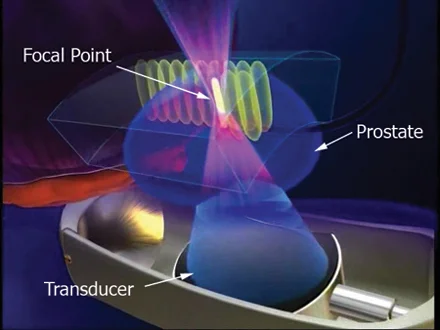I’d like to share my recent concern about the way in which one treatment option is being sold. HIFU, which stands for High Intensity Focused Ultrasound, is a non-FDA-approved method for treating localized prostate cancer. During the procedure, a rectal probe sends an ultrasonic beam of sound waves to the cancerous prostate. The beam heats and destroys the cancerous tissue, which is later urinated out.
Some web sites offer very factual, concise information about HIFU, its risks and benefits. One, in particular, however spends a great deal of time attacking robotic radical prostatectomy. Using phrases such as “limp and leaking” or warning men about the negative impact that prostatectomy surgery will have on their marriage. This seems to me to be counter to the united goal of the medical community to offer support and proven treatment and cure options. Rather than discussing HIFU successes, they focus on your trip to Cancun, Bermuda or the Bahamas for the procedure with pictures of blue waters and tropical excursions.
One analogy suggests that robotic prostatectomy surgery is like playing Russian Roulette. On the contrary! Prostatectomy is the one, true way for a doctor to plainly see the extent of the cancer. During robotic surgery I have a clean, clear view of the prostate and everything surrounding it. No amount of testing can give us as full a picture of the cancer staging before surgery. What is believed to be localized prostate cancer could actually be found to be more extensive during and after the surgery. I don’t approach patient education this way, but it could be argued that choosing an option besides surgery is Russian Roulette. Surgery is the only way to see that the cancer is fully removed. My patients have a 97% cure rate. Earlier this year, a ten-year American Urological Association (AUA) study found an 83% success rate with HIFU.
With regard to urinary continence and sexual function, my SMART (Samadi Modified Advanced Robotic Technique) surgery is a unique approach that allows me to preserve both. In most circumstances, you will be able to have sex with your wife. It’s highly likely that you’ll be able to control your urine over time. I don’t perform robotic prostatectomy surgery to boost my ego. I do it to help men live long, fulfilling lives.
HIFU may have appropriate application with some patients, but it is not FDA-approved and it does not give visual proof that all cancer has been removed. HIFU is still considered an experimental procedure in the United States. Robotic radical prostatectomy is a sound, proven treatment option for the elimination of prostate cancer.
Be wary of finding a medical miracle on a sandy beach. My goal is not to offer you a luxurious vacation and a quick fix. Strongly consider the benefits of minimally invasive robotic radical prostatectomy and whether it is right for you. The peace of mind that comes after surgery is priceless. And then you can take a tropical vacation with your wife to celebrate your happy marriage and your cancer-free life.












